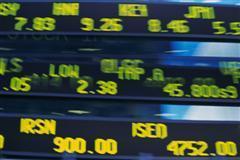| Home | About | Archives | RSS Feed |

@theMarket: Quarter Ends With a Bang
 The markets presented plenty of head fakes this quarter. In January, contrary to everyone's expectations, the gains of last year kept right on coming through most of the first quarter, only to hit a brick wall in March thanks to troubles in the Middle East followed by nature's one-two punch to Japan. Despite that, the indexes finished the first quarter with the best gains in over two decades.
The markets presented plenty of head fakes this quarter. In January, contrary to everyone's expectations, the gains of last year kept right on coming through most of the first quarter, only to hit a brick wall in March thanks to troubles in the Middle East followed by nature's one-two punch to Japan. Despite that, the indexes finished the first quarter with the best gains in over two decades.
The Dow racked up 742 points (6.4 percent), the S&P 500 Index gained 68 points (5.4 percent) while the NASDAQ closed up 128 points for a 4.8 percent gain. If we annualize those gains we could be looking at a 20 percent plus gain for the year, which puts my forecast of a 20-23 percent gain in 2011 right on target.
"It was a choppy quarter though," commented one client on Friday who lives in Dalton.
I agree. Clearly this market is exacting a price (higher stress and wear and tear on the nerves) for the gains we are making. I suspect that additional volatility is waiting for us as we continue to climb a wall of worry throughout this next quarter. Some of the concerns I believe will haunt us through the spring are the price of oil brought on by geopolitical turmoil, continued problems among European financial institutions and, of course, the end of QE II, which occurs in June.
Can the economy continue to grow without the multibillion dollar monetary stimulus that the Fed has been providing for well over a year? The economy appears to be growing and unemployment declining, but is that a function of real demand or simply a response to the Fed's easy money policies? How will the stock and bond markets react to an end to this stimulus?
Smarter people than I are expecting a rapid and disastrous response by the bond markets to the sunset of QE II. They believe that interest rates will immediately spike, disrupting what little lending is already occurring and thereby throwing the economy back into recession. I find that hard to believe.
I'm going to give our central bankers, led by Ben Bernanke, the benefit of the doubt. They read the same papers we do and are well aware of the fears of the markets. Is it really plausible that the Fed will step out of the game and simply watch from the bleachers if the doomsayers are right?
There is simply too much at stake and Ben Bernanke knows it. I believe the process of pulling out of the market will be a managed one. For those who pay attention to "Fed Speak," I maintain that process is already at work. Recently a number of Board Governors who have granted interviews advised the financial community that the Fed will be taking a more neutral policy position in regards to stimulus in the future.
That's not to say there won't be concerns and with them volatility. Skittish investors will always jump the gun, many times before they actually have the facts. In today's markets, trading on rumors is just as viable as trading on the facts. So prepare for some rough sailing; but I get ahead of myself.
As a portfolio manager, it's part of my job to fret and worry about what will be, instead of enjoying what is. And a rising market is what we can expect over the next few months. Sure, we can and will have down days, but I believe they will be short and shallow. Commodity stocks will lead, so make sure you have some exposure to those sectors, and if you haven't yet, get back into the stock market — now.
Bill Schmick is an independent investor with Berkshire Money Management. (See "About" for more information.) None of the information presented in any of these articles is intended to be and should not be construed as an endorsement of BMM or a solicitation to become a client of BMM. The reader should not assume that any strategies, or specific investments discussed are employed, bought, sold or held by BMM. Direct your inquiries to Bill at (toll free) or e-mail him at wschmick@fairpoint.net. Visit www.afewdollarsmore.com for more of Bill's insights.
| Tags: stocks, Federal Reserve |
@theMarket: The Coast Is Clear
 The stock market continues to be buffeted by bad news. Energy prices are climbing, war rages in Libya, Japan's nuclear crisis continues to radiate and Portugal's government resigned after failing to push through austerity measures intended to avert a financial crisis. The stock market simply shrugs it off and moves higher.
The stock market continues to be buffeted by bad news. Energy prices are climbing, war rages in Libya, Japan's nuclear crisis continues to radiate and Portugal's government resigned after failing to push through austerity measures intended to avert a financial crisis. The stock market simply shrugs it off and moves higher.
Pay attention readers. When markets continue to absorb negative news, the tea leaves tell me stocks are going higher. Last week, I wondered if the correction was over. The answer is yes. Some arcane variables I follow are flashing green. For example, market breath (the number of advancing stocks versus decliners) has made a sharp reversal over the last 10 days, which is a good sign. In addition, the percentage of stocks that are now above their 50-day moving average stands at 57 percent. If history is any guide that indicates we will enjoy a strong multimonth rally.
"But how can the very same worries that sank the market as recently as a week ago now no longer matter?" protested a snowbird with a summer house in Becket, who was convinced the world was coming to an end just a few days ago.
Markets tend to discount bad news and price in numerous "what if" scenarios over time. The European banking crisis has been with us for well over a year, so Portugal's problems no longer have the power to ratchet up risk on a worldwide basis. It would take serious financial problems in a really large country such as Italy or Spain to roil world markets down the road.
In the Middle East, the protests in Tunisia began in December of last year. Four months later, investors, who initially feared this unrest might spread to Saudi Arabia, now believe that if it were going to happen, it would have done so by now. Sure, oil will still remain at the $100 to $110 a barrel level until hostilities in Libya subside, but the rest of the market is already focusing on other things.
Finally, Japan, the world's most recent crisis, is far from over, but the inflated fears of a nuclear holocaust that drove the markets lower two weeks ago have been punctured leaving a mess (see this week's column "Who Pays for Japan?") but not one that will sink the world's markets. And in the meantime, U.S. GDP was revised upward for the last quarter of 2010 to 3.1 percent. Interest rates remain at historically low levels, and the economy appears to be gaining strength.
What we have had is a good old correction. Now it is over. Valuations are considerably lower (on average 7 percent) which has reduced the premiums in the equity market to a reasonable level. I believe the markets are poised to move substantially higher from here as I have written several times in the past. It appears the same cast of characters — materials, food, technology, industrials and energy — will lead the markets higher. Invest accordingly.
Bill Schmick is an independent investor with Berkshire Money Management. (See "About" for more information.) None of the information presented in any of these articles is intended to be and should not be construed as an endorsement of BMM or a solicitation to become a client of BMM. The reader should not assume that any strategies, or specific investments discussed are employed, bought, sold or held by BMM. Direct your inquiries to Bill at 1-888-232-6072 (toll free) or e-mail him at wschmick@fairpoint.net. Visit www.afewdollarsmore.com for more of Bill's insights.
| Tags: Japan, energy, correction |
@theMarket: A Week to Forget
In last week's market column, I warned readers of an impending decline of as much as 5 percent in the stock markets. I realize that not everyone receives both my columns each week. The important thing to know is that 4 percent of that drop has occurred but we may still have a re-test of the lows.
 Over the last few days I have been making a lot of what I call "hand holding" calls. These conversations are meant to summarize the events in both Japan and the Middle East, explain how we are dealing with this crisis, and answer any questions people may have. I soon discovered that my clients (and people in general) have been subjected to a lot of misconceptions, misinformation and still have many unanswered questions surrounding these crises. So let's try to set the record straight.
Over the last few days I have been making a lot of what I call "hand holding" calls. These conversations are meant to summarize the events in both Japan and the Middle East, explain how we are dealing with this crisis, and answer any questions people may have. I soon discovered that my clients (and people in general) have been subjected to a lot of misconceptions, misinformation and still have many unanswered questions surrounding these crises. So let's try to set the record straight.
"What's going to happen in the Middle East?" asked a local business owner from Pittsfield.
By now you know that the United Nations declared a no-fly zone over Libya on Friday. In response, Libya's foreign minister quickly declared a cease fire, but as of this writing, battles still rage within the country. On the news, both oil and precious metals declined from overnight highs. All three of those commodities have gyrated wildly all week in response to global events.
At the crux of this controversy, investors fear that while Libya is a small player in the oil markets, unrest in the region, whether in Gaddafi land, Bahrain or elsewhere, could spread to Saudi Arabia. Unrest within the Kingdom would jeopardize a much larger piece of the world's energy pie and could cripple global economic growth.
The ruler of Saudi Arabia, King Abdullah, has decided to short circuit any political unrest in his kingdom by buying off the people who count. Friday he announced a multibillion dollar boost in welfare benefits, bonuses for public-sector workers (including the army) and a massive program of new housing. This follows last month's $37 billion giveaway. Some of the money will also be spent on hiring, ahem, 60,000 new "security guards" at the interior ministry just in case this bribe does not appease all of the populace.
My belief is that tensions in the Middle East may continue, but their power to impact world equity markets is diminishing and as they do, the price of oil will slowly sink back to my target of $80-$90 a barrel, which seems a reasonable price for oil, given world economic growth.
Japan's crisis around the Fukushima nuclear plant, on the other hand, is still a wild card. No one knows what will happen in the days ahead. I maintain that, if the worst should occur, it will not have a substantial impact on the United States. The uncertainty, however, will keep world markets volatile for a bit longer.
If I measure this pullback from top to bottom, we have had a 7.01 percent decline. Over the last few days we have been experiencing a relief rally that has reclaimed about 3 percent of that fall. I am not certain that we have seen the lows yet on the S&P 500 Index. We could still test the 1,225-1,235 level if there were to be a nuclear meltdown at Fukushima or an air war with Libyan forces.
None of that changes my strategy and hopefully yours. This is a pull back to be bought. Don't try to catch the very bottom, simply add to your positions on down days. You should have been doing just that this week. I know I have.
Bill Schmick is an independent investor with Berkshire Money Management. (See "About" for more information.) None of the information presented in any of these articles is intended to be and should not be construed as an endorsement of BMM or a solicitation to become a client of BMM. The reader should not assume that any strategies, or specific investments discussed are employed, bought, sold or held by BMM. Direct your inquiries to Bill at 1-888-232-6072 (toll free) or e-mail him at wschmick@fairpoint.net. Visit www.afewdollarsmore.com for more of Bill's insights.
| Tags: oil, energy, Middle East, Japan, nuclear |
@theMarket: No More Than 5 Percent
 Patience is a virtue that many investors find difficult to master, present company included. However, this time it appears to have paid off. The tight trading range that held the market captive over the last few weeks has finally been broken. Unfortunately it was to the downside.
Patience is a virtue that many investors find difficult to master, present company included. However, this time it appears to have paid off. The tight trading range that held the market captive over the last few weeks has finally been broken. Unfortunately it was to the downside.
This week, especially Thursday, a major sell-off occurred across all asset classes — equities, gold, silver, crude — with economically sensitive stocks leading the decline. It is a key indicator, for me and suggests that the flush-out, selling climax or whatever you want to call it is beginning.
The ostensible reasons for this rout were numerous: a sudden and surprising trade deficit in, of all places, China, a downgrading of Spanish debt by another credit agency, a jump in U.S. jobless claims and of course, some further bad news from the Middle East. This time the concern is riots in the eastern part of Saudi Arabia.
On Friday, all these troubles took a back seat to a devastating earthquake/tsunami that struck Japan spawning another tsunami that raced across the Pacific toward Hawaii and the West Coast of the U.S. mainland. Suffice it to say that the markets remain volatile. I'm hoping for a conclusion sometime this coming week and if not, we will all need to practice the "P" word.
Investors were jumping into U.S. Treasuries and the U.S. dollar in a bid for safety. At the same time, Bill Gross, the head of Pimco, the largest bond house in the world, said he has sold all but the very shortest of his Treasury bond holdings in his largest fund. In explaining the sale, he said:
"When a trillion and a half dollars worth of annualized purchasing power disappears," Gross said, referring to the end of the Fed's QE 2 operations, "I simply question as to who will buy them and at what yield."
When Bill speaks, the bond world listens and so should you.
However, this is not the time to panic. Although it may well feel like an irresponsible action to take, I say gird your loins, start purchasing equities and if you are still in Treasuries (after my numerous pleas to sell), this is an opportune time to unload.
"How deep of a pullback are you looking for?" asked a reader from Great Barrington on Friday.
Well let's look at the technicals.
The S&P 500 Index has a lot of support around 1,265-1,270, failing that, the next level would be 1,225. So from around1, 300, we are talking about no more than a 5 percent correction. As I have often said, equity investors should expect corrections of up to 10 percent at regular intervals in the stock market. It is simply the cost of doing business and if you can't take that kind of volatility you don't belong in the stock markets, period.
Silver, on the other hand, has hit my price target of $36-$37 an ounce. Since I'm fairly disciplined when it come to trading commodities, I have cashed in about half of my chips, although I remain long gold for now. It just seems to me that a 300 percent gain in silver calls for some profit taking. I hope you agree.
That does not mean I will abandon the metal entirely. I believe silver will consolidate as metals often do for several weeks or possibly months before moving higher. In the long term, I believe silver has further upside as do most metals. For longer-term investors I suggest you take your lumps in the short-term. As for me, I will wait until it pulls back to a more reasonable level before becoming interested once again.
Oil, however, as I have reiterated, has more than reached my price target of $100 a barrel. My strategy for investors in that area had been to first reduce exposure to energy stocks, followed by a reduction in oil itself. It doesn't bother me that the talking heads are betting that oil goes higher. If they want to risk their money on an extra $10 worth of upside, let them. I think the easy money has been made (from $35/bbl. to $100 a barrel) and that's what I try to achieve — low risk, high return trades.
Hang in there readers, there are better days ahead.
Bill Schmick is an independent investor with Berkshire Money Management. (See "About" for more information.) None of the information presented in any of these articles is intended to be and should not be construed as an endorsement of BMM or a solicitation to become a client of BMM. The reader should not assume that any strategies, or specific investments discussed are employed, bought, sold or held by BMM. Direct your inquiries to Bill at 1-888-232-6072 (toll free) or e-mail him at wschmick@fairpoint.net. Visit www.afewdollarsmore.com for more of Bill's insights.
| Tags: metals, commodities, disasters |
@theMarket: Time Corrections
 There are different kinds of corrections in the stock market. None of them are pleasant to endure. This particular pullback appears to be one of the least painful. It is called a time correction.
There are different kinds of corrections in the stock market. None of them are pleasant to endure. This particular pullback appears to be one of the least painful. It is called a time correction.
Most investors are familiar with what I call the "gap down," when markets drop 1-2-3 percent or more in a few days. We had a lot of those babies back in 2008-2009. Then there are the "slow bleed" sell-offs, where the markets drop a smaller amount but maintain a steady grind downward, punctuated by one or two feeble up days. So far this time correction, now in its second month, appears to be locked in a fairly tight trading range on the S&P 500, between 1,340 on the upside and 1,275 on the bottom.
A time correction can provide exactly the same outcome as its more dramatic (and debilitating) cousins. Remember why corrections occur in the first place. At a certain price level, sellers believe the risk of holding stocks is too high given the perceived investment climate. There are several reasons that the bears want to sell: Libya, higher oil prices, the simultaneous fear of both inflation and slower growth, and stocks are extended and overbought. Sellers believe that the level of the S&P 500 is an attractive price in which to take some profits.
Then there are the buyers who believe the oil price will retreat as Middle East tensions dissipate over time. These bulls see the U.S. economy growing, unemployment falling and the Fed's QE 2 continuing to provide support for the stock market. The bulls are looking for deals and are not willing to pay anymore than 1,300 or so for stocks as represented by the S& P 500 Index level.
As new developments (negative or positive) come to the forefront, the buyers or sellers will react on any given day by pushing the averages up or down. What is important here is that over time (if the news remains the same) all the sellers who wish to sell will finally do so, leaving only buyers. At the same time the overextended, overbought condition of a great many stocks will have run its course leaving them in a condition to resume an uptrend.
Could stocks break through this range either up or down?
Of course they can and often do. In bull trends, such as the one we are in right now, it usually signals a selling climax. I don’t advise holding out for some climatic sell-off in order to buy this dip but rather accumulate equities as we trade closer to 1,300 and avoid chasing stocks on the upside unless some definitive solution to the Libyan problem suddenly materializes.
I personally believe that either Gaddafi will melt away, like the Wicked Witch of the East, or flee to Venezuela to his buddy Hugo, the Wizard of Venezuela. Oil prices will decline and the markets, now refreshed by this pause, will take you and me on a rapid and exhilarating ride higher.
In the meantime, patience would be a virtue that I would cultivate during these somewhat volatile times. If that doesn't work, just stop eyeballing your portfolio every few hours and do something productive instead, like e-mailing me your investment questions.
Bill Schmick is an independent investor with Berkshire Money Management. (See "About" for more information.) None of the information presented in any of these articles is intended to be and should not be construed as an endorsement of BMM or a solicitation to become a client of BMM. The reader should not assume that any strategies, or specific investments discussed are employed, bought, sold or held by BMM. Direct your inquiries to Bill at 1-888-232-6072 (toll free) or e-mail him at wschmick@fairpoint.net. Visit www.afewdollarsmore.com for more of Bill's insights.
| Tags: corrections, bears |

